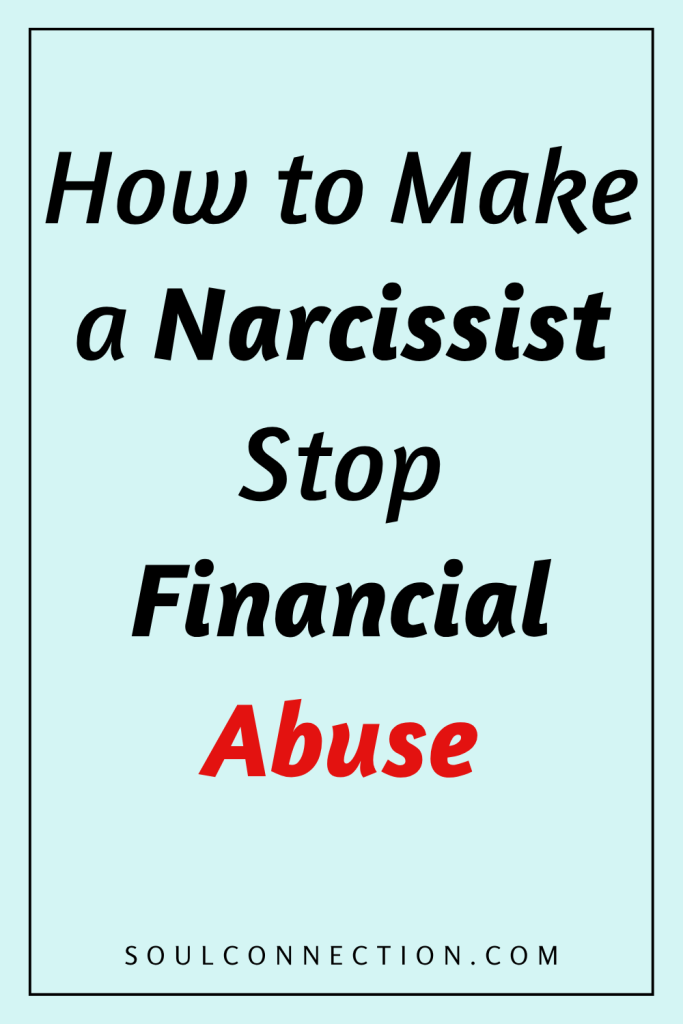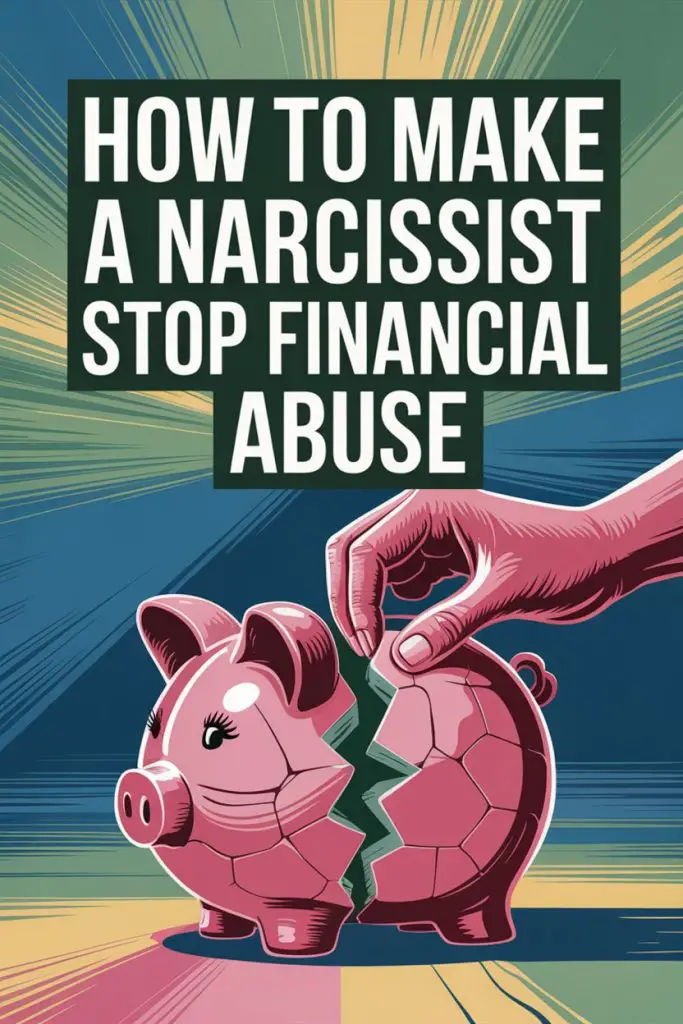Money, as they say, makes the world go round—unless you’re in a relationship with a narcissist, in which case it mostly spins in their direction, like a malfunctioning merry-go-round.
If you’ve ever found yourself asking permission to buy your own socks, or if you’re the proud owner of a joint account that only your partner ever accesses, congratulations: you’ve met financial abuse, narcissist edition.
Shaking loose of this particular brand of control isn’t as simple as hiding a fiver in your bra or memorizing your bank PIN in Pig Latin. Narcissists are, if nothing else, persistent.
They’re financial Houdinis, except the only magic trick they know is making your independence disappear. But you’re not stuck.
There are ways—practical, legal, and emotional—to wrestle back control. Grab a cuppa, settle in, and let’s get your wallet some freedom.
Spotting Financial Abuse When It’s Dressed as “Love”
Narcissists rarely lead with, “I’m going to ruin your credit rating.” Their tactics are sneakier, often dressed up as concern, love, or “just being practical.”
Maybe they insist on handling all bills because “you’re so busy,” or they criticize your spending on essentials but splash out on their own hobbies.
If every financial conversation ends with you feeling smaller, guiltier, or a tiny bit nuts, it’s not a budgeting issue—it’s control.
Common signs:
- You need “permission” for spending—even on basics
- Your earnings or assets are hidden, siphoned, or “borrowed”
- You’re not allowed access to shared or your own financial records
- They sabotage your job or education opportunities
- Your financial mistakes are weaponized, but theirs are shrugged off
If this sounds familiar, it’s not you being “bad with money.” It’s someone making sure you never have enough autonomy to leave.
Why Narcissists Love Financial Control
For a narcissist, money isn’t just for buying stuff; it’s a tool for power. They want to be the gatekeeper of everything you value, and what do most adults value? Independence.
The ability to make choices. The freedom to buy the nice cheese without a Spanish Inquisition.
When financial abuse is in play, it’s never just about cash. It’s about making sure you have to ask. That you never feel quite safe or stable unless they’re in a good mood.
Job lost? That’s independence lost. Credit ruined? Now you “need” them. It’s a neat, ugly cycle.
Setting Boundaries Without Starting World War III
Now, you might be thinking, “If I even hinted at wanting my own account, the drama would make reality TV look tame.” Quite possibly. Narcissists are not famous for their receptive listening skills.
But boundaries aren’t just about telling someone “no”; they’re about protecting your sanity, one tiny fence at a time.
Start small:
- Insist on transparency with joint money. “Let’s both see the statements each month.”
- Request a separate account “for bills” or “for my work expenses.”
- Avoid justifying or explaining every financial move. “This is what works for me.”
- Document all financial decisions—screenshots, emails, statements. Your phone camera is your new best mate.
Remember, you’re not asking for permission. You’re stating a need. There’s a difference.
Reclaiming Your Income and Identity
If you’re earning money, you’re entitled to manage it. End of story.
Narcissists may try to convince you otherwise, painting themselves as the only one responsible enough to handle funds. (This, from the person who once spent the rent money on collectibles.)
If your pay is direct deposited into a joint account, arrange for it to go into an account only you can access. If that’s not yet possible, consider a cash stash for small, urgent needs. Even if it’s just bus fare, it’s a start.
Education and upskilling count for a lot, too. Financial independence is more than just cash—it’s knowing you can get and keep a job, or run your own business, without sabotage or guilt trips.
Get Nosy About Your Own Finances
Treat your finances like a suspiciously quiet toddler—you want to know what’s going on at all times. Request credit reports, bank statements, and details of any “joint” loans or credit cards.
If you spot anything you didn’t sign off on, make a record. If your partner has opened accounts or taken out debts in your name, it’s time to bring in legal backup.
It may feel awkward or “untrusting,” but remember: trust is a two-way street. If your partner doesn’t want you to see the numbers, it’s not about trust—it’s about control.
Legal Shields and Paper Trails
Financial abuse isn’t just unpleasant; it can be illegal, especially if it involves identity theft, fraud, or violating joint agreements. If you’re married or living together, know your legal rights.
Some regions protect both partners in marriage, but others are more laissez-faire (translation: good luck, mate).
Safeguard yourself:
- Change passwords on your personal accounts and devices
- Store financial documents in a safe place (digital copies are a winner)
- If you’re married, consult a lawyer about your rights—many offer free first consultations
- Consider freezing your credit if you suspect they’re opening accounts in your name
Don’t panic, but don’t delay. It’s easier to prevent a mess than to clean it up later.
Build a Support Squad Who Gets It
Narcissists thrive in silence. The less you talk, the more power they have.
Break that script. Find at least one person—a friend, sibling, therapist, financial counselor—who can help sanity-check your plans and keep you grounded.
Group chats are brilliant for venting, but for financial advice, aim for someone with experience: a domestic violence advocate, a financial abuse specialist, or just the financially-savvy mate who knows how to squeeze a tenner until it squeaks.
Online forums and helplines can be lifelines, especially if local support is thin on the ground.
Prepare for Pushback (Because There Will Be Some)
Announcing your intention to have financial independence is, to a narcissist, like waving a red flag at a particularly petulant bull. They may love-bomb, guilt-trip, threaten, or suddenly transform into the world’s most attentive partner.
Spoiler: it’s not permanent.
Expect:
- Emotional manipulation (“You don’t trust me?”)
- Grand gestures (“Fine, take it all—I don’t care!”)
- Guilt trips (“You’re tearing this family apart.”)
- Smear campaigns (“She’s always been terrible with money!”)
Stick to your guns. If you’re worried about safety—physical, emotional, or financial—reach out to professionals who can help you plan an exit or escalation safely.
When Leaving Is the Only Way
In some cases, stopping financial abuse just isn’t possible with the narcissist still in your life. If you’ve tried conversations, boundaries, and backup, and things only get worse, it’s not a failure on your part.
Narcissists are world-class at moving goalposts and rewriting history.
Secretly preparing to leave? Make copies of important documents, set aside emergency cash, and get advice from support services about protecting your finances during a breakup or divorce.
The more you plan, the safer you’ll be.
No shame in cutting your losses and making a break for the exit. Sometimes, the only way to win is not to play.
Teaching Kids About Money (and Power)
If kids are in the mix, their sense of financial normal can get warped faster than pocket money vanishes at a lolly shop. Make sure your children hear your voice about money—what it’s for, how it works, what choices look like.
Model healthy habits: talk about bills, saving, and giving every dollar a job. Show them that money isn’t for controlling others or buying love.
If your partner undermines this, keep your message steady. Your kids might not thank you now, but they’ll remember it later.
Freeing Your Wallet, and Yourself
Stopping a narcissist’s financial abuse isn’t about winning a prize for Best Budgeter or being the first to open a savings account.
It’s about reclaiming your right to make choices, to feel safe, and to know that your dreams—big or small—don’t need a rubber stamp from anyone else.
The road back to financial independence can be bumpy, but every step away from control is a step toward freedom. Trust yourself. Get help.
And remember: even the tightest grip can’t hold you forever, not once you’ve decided you’re done letting go of your own life.
Now, about that nice cheese—add it to the shopping list, would you?


